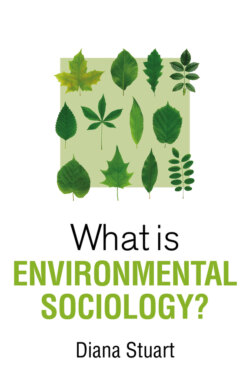Читать книгу What is Environmental Sociology? - Diana Stuart - Страница 9
Public Environmental Sociology in an Age of Crisis
ОглавлениеIncreasingly, environmental sociologists are participating in cutting-edge research and are publishing work with important social implications. Their research has illustrated how environmental impacts are unequally experienced, and elucidated the overlooked relationships between economic and environmental realities, the false promises of “silver bullet” environmental solutions, and how we can find environmental solutions that are the most effective and just. This work is not only published in prominent academic journals but is also highlighted in mainstream media outlets such as the New York Times. As we are in uncharted waters, facing increasing existential threats, this work is more important than ever.
This book introduces environmental sociology through focusing on recent work in the field and also through emphasizing public sociology. Public sociology goes beyond sociology for academic purposes and involves research that has important implications for society. For example, work highlighted in this book has important implications for identifying, understanding, and addressing our escalating environmental crisis, which is of increasing public concern. Public sociology can result in findings that garner widespread attention and are useful to policymakers, social movements, and others working to foster positive social change. Environmental sociologists continue to make significant contributions to public sociology, and diverse examples of public sociology will be emphasized throughout the book. While most of the examples and approaches in this book focus on scholars from the United States (US) and Europe, there is important work in environmental sociology happening across the globe and in the Global South, some of which will be highlighted in this book. The primary focus on the Global North is due to the accelerating levels of over-production and overconsumption in affluent nations that are primary drivers of our environmental crisis and therefore must be addressed.
In an age of increasing and intersecting crises—not only related to climate change and biodiversity loss but also economic inequality, health, democracy, and institutionalized racism—it is easy to become overwhelmed and disillusioned by any one of the crises we face. For some it may seem more comforting to deny that these crises exist. Others may choose the path of optimism, believing that everything will work out fine in the end because technology or human innovation will save us from the worst possible outcomes. In addition, there are those who have already decided that the fate of humanity is sealed, we are doomed, all hope is lost, and there is nothing we can do about it. These are narratives that people often tell themselves because, according to each of these narratives, we should simply continue with the status quo. These responses are understandable, as social change is difficult to imagine and it is easy to feel overwhelmed and helpless when faced with multiple and escalating crises.
However, these narratives represent forms of delusion that distract us from the real work that needs to be done. Both falsely optimistic and fatalistic narratives can serve as pernicious distractions that delay the necessary action. We stand at a critical moment in time where there is still a small window of opportunity to act to prevent the worst-case scenarios. Indeed, the impacts are very serious and some are already unavoidable. For example, average global temperatures will continue to increase; however, the extent of this increase is yet to be determined. As Rebecca Elliott (2018) explains, climate change has and will continue to result in material, psychological, and emotional loss. Some loss is inevitable, yet a 2°C warmer future and a 4°C warmer future by 2100 will be dramatically different, with vast moral implications. None of the crises we face represent an “all or nothing” situation that would support giving up. In each case, we can either do very little and experience tremendous loss, or we can do as much as we can to create the most sustainable and just future possible. Therefore, public environmental sociology takes on critical importance in this crucial moment. It is not a time to take comfort in false narratives. It is a time to understand what is at stake and to go all in. As we will see throughout this book, public environmental sociology has and will continue to play an important role in this work.
